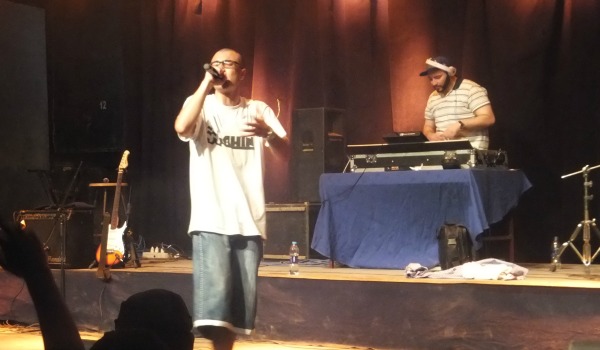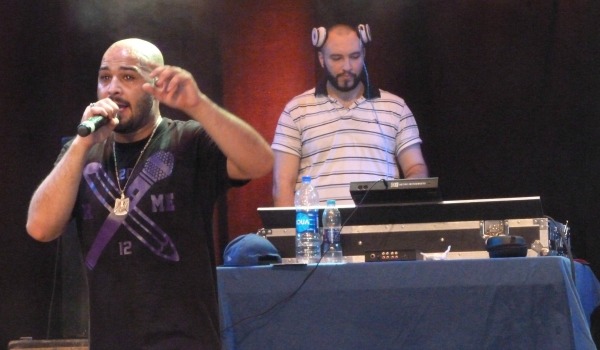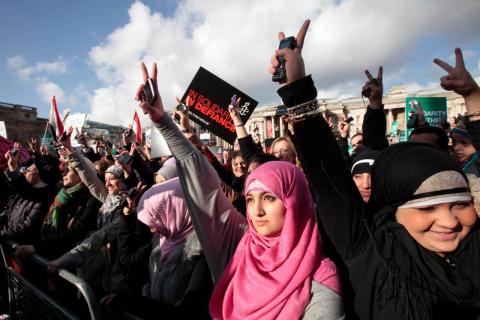In a night dominated by electrifying beats and freestyle performances, the Egyptian Hip Hop Union presented the best of Egypt's Hip Hop scene on Thursday, 20 June at El-Sawy Culturewheel in their third major event.
The evening dubbed I Breath Hip Hop showcased an interesting line-up of young underground and mainstream talents, covering all subgenres: Hip Hop, R&B, hardcore Rap, Freestyle, Beat Box and Electro.
The Egyptian Hip Hop Union was created after 2011 to unite all Hip Hop artists under one umbrella.
The show organiser and union founder, Takki tells Ahram Online that "the idea is not new and it aims at uniting all rappers in one community to strengthen the scene and the music, instead of every one struggling on his own in the name of Hip Hop."
Takki is one of the early founders of Rap music in Egypt. From an early age he was interested in Western Rap; in 1998, along with Mahmoud and Michael, he created the first Rap group in Egypt, MTM. The band released its first album in 2003, scoring huge success in the mainstream scene.
"Nowadays Rap is getting a lot of attention and many names are rising, but what was left is to have an institution that connects all artists across the country," Takki added.
The union brings together a number of heavyweights in the Egyptian underground scene, like Zap Tharwat, Asfalt, Y Crew and Arabian Knights.
"We are trying to set a standard, so that not anyone can produce a song at home and call themselves a rapper; by doing this some people are destroying the reputation of Hip Hop in the country," Takki comments.
Not only is the Union giving a stage for younger people to present their talent, but it also helps beginners who want to learn the basics and the techniques by organising workshops for writing, rapping or producing.
The concert started with Wara2a b-100 (which translates as 100 Egyptian Pound bank note), a three-man project from Alexandria. Although the band launched its activities with the start of the January 2011 Revolution, the members have been developing their musical talents from an early age.
"Most of our songs are political," El-Banna, a Wara2a b-100 member, says to Ahram Online.
The band sang and produced a song called Tamarod (Rebel) in support of Egypt's fast-growing Rebel Campaign, which is collecting signatures to withdraw confidence in President Morsi and demand early elections.
##
"Amid political disturbances, it would be irrelevant to sing about cars or parties, for example," El-Banna emphasised.
Another rapper who stole the audience's attention is Shaheen El-Abkary, a former member of the Y-Crew Family, who was featured in 2010 Egyptian independent film Microphone.

Shaheen al-Abkary (Photo: Adham Youssef)
Shaheen started his passion for Rap at an early age, since he listened toTupac and other old school rappers. In 2007, at the age of 15, he joined Y-Crew.
For Shaheen, Rap is saying what you want with your own style. "I like to talk about issues that disturb people but in a more sarcastic way, to make them either laugh or cry about those issues," Shaheen tells Ahram Online.
##
Shaheen nimbly performed a number of satirical songs mocking the political and social situation in Egypt, and freestyled to engage fans. After his performance, Shaheen yelled "This is Hip Hop!"
More hardcore, another talent, F. Killa, rapped on social and political problems.
Killa uses harsh vocals to rap in Arabic to address problems of the Arab region like poverty, sexual harassment, corruption and unemployment.
"Before the Arab Spring I rapped about regime corruption in an indirect way" Killa tells Ahram Online. In the last months, Killa released songs criticising the Muslim Brotherhood rule and calling for a regime change.
Influenced by MC Amin, Arabian Knights, DAM and Omar Boflot, Killa was the most extreme in delivering his messages among the line-up.
Killa assured that the step that Egyptian Hip Hop Union is taking is a good, organised way to gain recognition and respect from the audience.
"Rappers and Hip Hop artists are considered 'monologists' by the music syndicate and as such cannot fall under its umbrella. This is an insult to the art that any of us is performing. Yes, the genre might be sarcastic or explicit in some cases, but we try to discuss issues that relate to our societies," Killa said.
##
The 20 June concert included other veterans in the Rap scene in Egypt.
The official MC (Microphone Controller) of the concert was DJ Fat Sam, Hip Hop DJ and beat maker.

Sam entered the scene in 2004 and later joined into the community of Hip Hop MCs, rappers and break dancers, which included Arab League, Asfalt, Deeb and Boflot.
Another rapper who is known for his unique song writing and music production style is Cairo-based Mohamed El-Deeb, a rapper who grew up listening to Hip Hop.
Just like many Egyptian expats who left their home at a young age, he feels close to his Egyptian heritage and culture. Influenced by Arabic poetry and prose, Deeb is trying to mix colloquial Egyptian language with his beats to rediscover Egypt's identity.
##
"Hip Hop was the sound of the street and the people. Many used it to demonstrate their discontent and anger. We can do the same in our culture. We like poetry and prose, sarcasm and punch lines; we can use it as a tool to address issues" Deeb explained.
Although the concert ran late into the night and few fans were left at the end, rappers on the stage continued interacting with the audience.
Since the concert attracted attention to the art of Hip Hop music in Egypt and emphasised solidarity between the artists, the main theme I Breath Hip Hop was strongly resonating throughout the whole evening.
As such all the musicians proved that although tastes and techniques might differ, Hip Hop will always be an artistic, priceless tool that offers the ability of conscience and to comment on current issues that artists feel essential to be discussed.
____________
See also:
Hip Hop Revolution & Arab Spring


Spread the word